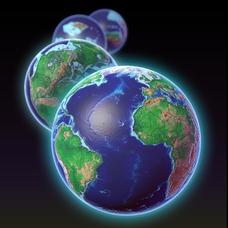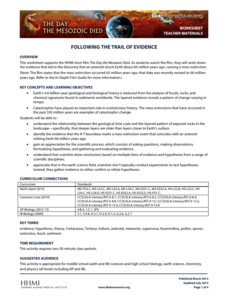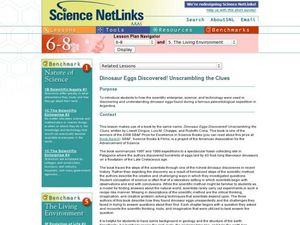Core Knowledge Foundation
The History of the Earth Tell It Again!™ Read-Aloud Anthology
A read-aloud anthology focuses on Earth's history. Over three weeks, young scholars listen to and discuss stories about the layers of the Earth, minerals, fossils, different kinds of rocks, and dinosaurs. After the lesson's text, each...
Howard Hughes Medical Institute
EarthViewer
Can you imagine Washington DC and London as close neighbors occupying the same continent? Learners will be fascinated as they step back in time and discover the evolution of the earth's continents and oceans from 4.5 billion...
CK-12 Foundation
CK-12 Earth Science Concepts for Middle School
Explore a variety of science concepts in an interactive textbook created for middle school scholars. A lengthy table of contents takes readers to pages comprised of a subject overview, outline, and summary. Follow links further to find...
Alabama Learning Exchange
The Big Bang Theory: An Evidence-Based Argument
What evidence supports the big bang theory? Individuals analyze scholarly resources about the the theory and develop arguments backed by evidence. They brainstorm, share ideas, watch a video, and read articles to complete a graphic...
Howard Hughes Medical Institute
Following the Trail of Evidence
One important skill in analyzing scientific evidence is identifying facts versus opinions. Scholars identify pieces of evidence from the film The Day the Mesozoic Died and then discuss this evidence in small groups at the end of each act...
School Science
The Big Bang Time Machine
Scholars take off on an interactive spaceship to explore a historical timeline of the big bang theory. They learn about the evolution of mammals and humans, the formation of stars and planets, and the chemical composition of the early...
Howard Hughes Medical Institute
Deep History of Life on Earth
Take it all the way back! Young scientists discover the changes that took place from the time Earth became solid to present day through an interesting interactive. The resource guides users through key events that have shaped our world...
Space Awareness
History of the Universe
Your pupils may believe that you and their parents are the oldest things in the universe, but surprise! There are elements of the universe that are even older. Elementary scientists create a class timeline to demonstrate the...
University of Colorado
Astro-Chronology
Class members play a version of the game Chronology to determine when certain scientific events occurred in history. Teams play until someone has 5-10 events in the correct order.
National Science Teachers Association
Adopt-a-Dino
Earth historians research a specific dinosaur, write a paper about the Mesozoic era that it lived in, create an artistic rendition of the environment, and give a presentation in class about what they learned. Be aware that there are...
Curated OER
Dinosaur Eggs Discovered! Unscrambling the Clues
Just a heads up: this lesson is based on a book, Dinosaur Eggs Discovered! Unscrambling the Clues. If you do not have or do not want to purchase the book, you may still find the other activities and worksheets useful in your earth...
Curated OER
Ice Ages
Interested Earth enthusiasts are introduced to ice ages. The 26,000-year cycle is charted and the eras named. Several slides are dedicated to the carbon cycle and how it contributes to the changes. The reasons for the cooling of the...
Curated OER
Making The Geologic Time Scale Real
Students construct a geologic timeline the size of a football field. They work in small groups to calculate the yardage for significant events in the Earth's history and then as a class pace out all of the events.
Curated OER
Making Materials for Parts of a Fossil
Young scholars create fossil books to study the process for crinoid fossilization. In this fossils lesson, students color and identify the fossilization process of a crinoid. Young scholars then create a booklet out of the information.















